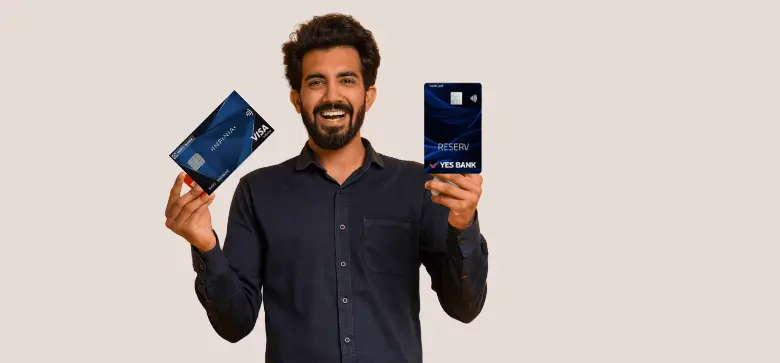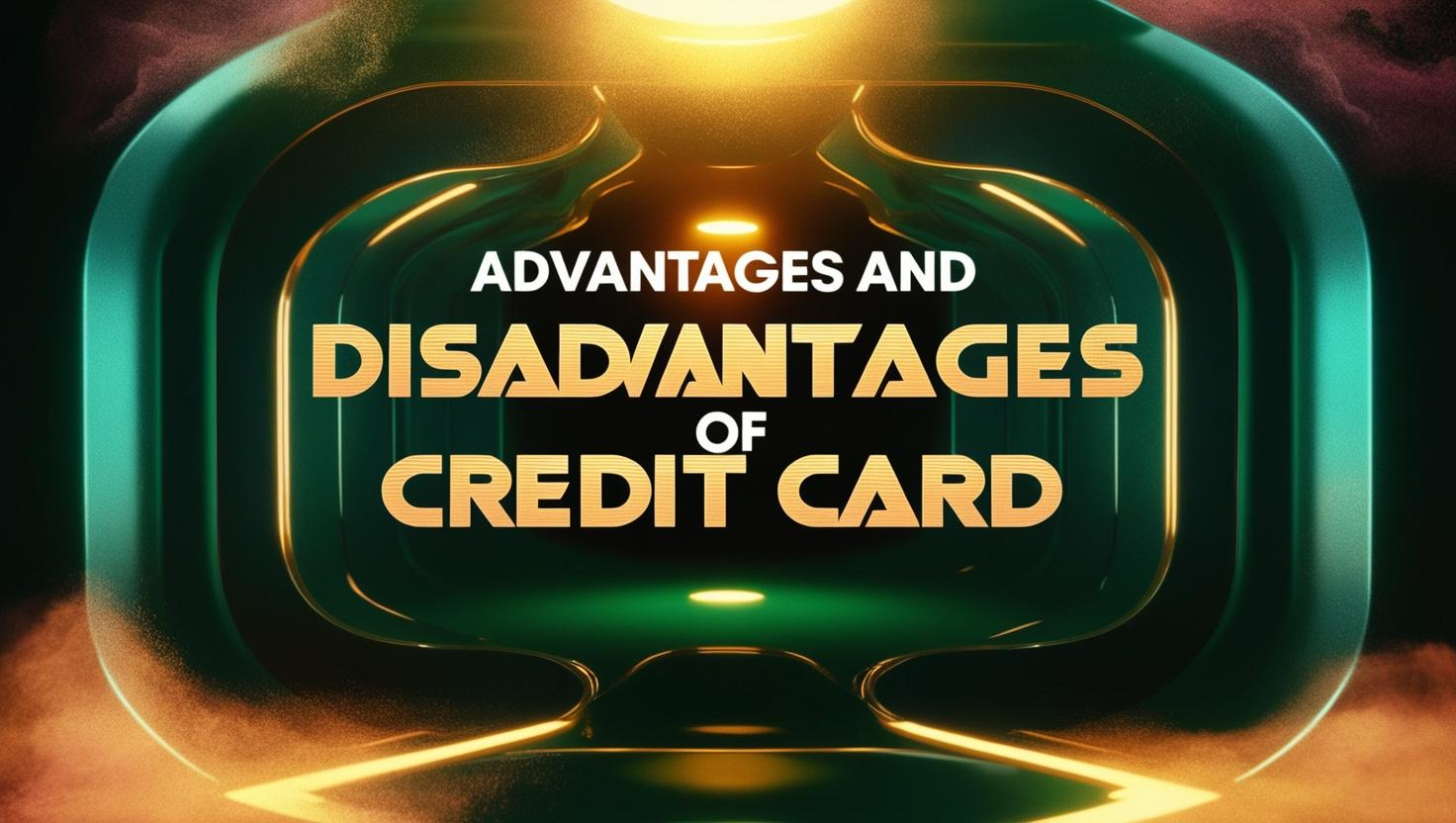
25 February 2026
With its ease of use and convenient pay-back options, credit cards have become an indispensable part of our lives. Credit cards have both merits and demerits. A credit card's discounts, offers, and deals are unrivaled by any other financial product and spell a bonanza for the wise user. However, credit cards can become debt traps if not used correctly or if you spend more than you can repay when the bill arrives.
However, credit cards can become debt traps if not used correctly or if you spend more than you can repay when the bill arrives.
If you're new to the world of credit, here's a rundown of the pros and cons of credit cards.
Credit cards are types of pre-approved credit. It means it has a pre-set limit. You can use the card for any transaction up to the limit. The card can be used for hotel reservations, restaurants, gas stations, online shopping, and so on. The credit card will accrue charges once it is used. After a certain period, you must clear the dues or the minimum due amount. If you do not pay the due amount within that time frame, you will only be charged interest. So, even if you don't have enough money in your account for a specific period, you can still buy something and pay it back later when you get more money.
While this form of credit is extremely popular across the world, knowing credit card advantages and disadvantages is important. The advantages of using a credit card is immense if done rightly. Let us take a look at them.
High Limit Credit Cards for Smart Shoppers
Spend More and Earn Higher Rewards
One of the biggest advantages of using a credit card is the ease with which credit can be obtained. Credit cards operate based on deferred payment, which means you can use your card now and pay for your purchases later. The money used does not leave your account, so every swipe does not deplete your bank balance.
Credit cards allow you to build up a line of credit. This is critical because it allows banks to view your active credit history based on card repayments and usage. Credit card usage is frequently used by banks and financial institutions to assess a potential loan applicant's creditworthiness, making your credit card important for future loan or rental applications.
If you want to make a large purchase but don't want to use your savings, you can put it on your credit card to defer payment. In addition, you can choose to pay off your purchase in equal monthly installments, avoiding paying a lump sum and depleting your bank account. Using EMI to pay for a purchase, such as a television or an expensive refrigerator, is less expensive than taking out a personal loan.
Most credit cards come with a slew of offers and incentives to encourage you to use your card. These can range from cash back to rewards points accumulated each time you swipe your card, which can then be redeemed as air miles or used to pay off your outstanding card balance. Lenders also provide discounts on credit card purchases, such as flight tickets, vacations, or large purchases, allowing you to save money.
Credit cards have an interest-free period, which is a time period in which your outstanding credit is not charged interest. You can get free, short-term credit for 45-60 days if you pay off the entire balance due by the due date on your credit card bill. As a result, you can benefit from a credit advance while avoiding the fees associated with having an outstanding balance on your credit card.
A credit card keeps track of every purchase made with the card, and a detailed list is sent with your monthly credit card statement. This can be used to determine and track your spending and purchases, which can be helpful when creating a budget or filing taxes. Lenders also provide instant alerts when you swipe your card, detailing the amount of credit still available and the current balance on your card.
Credit cards provide extra security in the form of insurance for card purchases that are lost, damaged, or stolen. If you want to file a claim, you can use the credit card statement to back it up.
Credit card companies offer appealing benefits such as reward points and cashback. You can exchange your reward points for fantastic gifts and merchandise. In the case of cashback, the money is credited directly to your account. For example, some credit card companies offer INR 50/- (an example only; the actual amount may vary) cashback on an electricity bill payment. This is a fantastic advantage of having credit cards.
This is especially beneficial for sole proprietorships, small and medium businesses, and salaried individuals who do not receive a card from the office but must travel on official business frequently. Keeping separate accounts allows for better account management. You can, for example, use your credit card to pay for an office tour. So, when you submit the bill, you can easily distinguish between tour expenses and personal expenses.
Experience Rewards with Every Swipe
The most significant disadvantage of a credit card is the misuse of the ‘minimum amount due feature’. Many credit card holders are misled into believing that the minimum amount is the total amount owed, when in fact it is the minimum amount that the company expects you to pay in order to continue receiving credit facilities.
As a result, customers assume their bill is low and spend even more, accruing interest on their outstanding balance, which can quickly add up to a large and unmanageable sum.
It is critical to thoroughly examine the credit card statement and understand all of the major credit card terms to avoid falling into a debt trap.
Credit cards appear to be simple and straightforward at first glance, but they have a number of hidden charges that can quickly add up. Credit card taxes and fees include late payment fees, joining fees, renewal fees, and processing fees.
Missing a card payment may result in a penalty, and repeated late payments may result in a reduction in your credit limit, which will harm your credit score and future credit prospects.
However, you can easily get rid of high-interest charges on a credit card if you continue to pay your credit card bills on time.
Because your bank balance remains constant with revolving credit, it may be tempting to charge all of your purchases to your card, leaving you unaware of how much you owe. This could result in you overspending and owing more than you can pay back, starting the debt cycle and incurring high-interest rates on future payments.
To avoid overspending on your credit card, limit your spending to 30-40% of your credit limit. Ensuring this, as well as remaining a little tight on your unnecessary expenses, will keep you from overspending and, as a result, will keep you from falling into debt.
If you do not pay your bills by the due date, the amount is carried forward and interest is charged. This interest is accumulated over time on purchases made after the interest-free period. Credit card interest rates are quite high, with the average rate being 3% per month, amounting to 36%.
Some credit cards, such as the fuel credit card, waive the fuel surcharge. When the transaction amount falls within a certain range set by the bank, the surcharge fee is usually waived. Additionally, there may be a monthly surcharge waiver amount cap. This reduces interest by some amount.
Though it is uncommon, you may become a victim of credit card fraud. With technological advancements, it is possible to clone a card and gain access to confidential information, allowing another individual or entity to make purchases on your card.
Examine your statements carefully for any purchases that appear suspicious, and notify your bank immediately if you suspect card fraud. If the fraud is proven, banks will usually waive the charges, so you will not have to pay for purchases made by the thief.
To protect yourself from such fraudulent transactions, you can disable all foreign transactions on your card. You should also avoid opening any emails or messages that appear suspicious to you. In addition, do not give your credit card to anyone or share your credit card details or PIN with anyone.
Cash withdrawals from credit cards, unlike debit cards, are subject to a fee. When using a credit card to withdraw cash, there is an annual interest rate of around 40% (3.35 percent per month).
To avoid paying any additional charges, which is regarded as one of the major disadvantages of credit cards, you should refrain from withdrawing any funds using your credit card. Instead, make cash withdrawals with your debit card.
Many credit cards have additional fees, such as an annual credit card fee, foreign transaction fees, cash withdrawal fees, and so on.
Before applying for a credit card, you should read all of the terms and conditions to ensure that no hidden fees exist. Before you choose the type of credit card that you want to buy, you should be aware of all the expenses that you may have to incur on your credit card.
Swipe Smart and Unlock High Rewards
Earn Miles, Cashback, and Exclusive Offers
Credit Card Insights
CIBIL Score Check and Boost Guide
Debit Card Tips & Setup Guide
Credit Tracker Related Other Articles
Credit Score Basics and Full Forms
Disclaimer
The starting interest rate depends on factors such as credit history, financial obligations, specific lender's criteria and Terms and conditions. Moneyview is a digital lending platform; all loans are evaluated and disbursed by our lending partners, who are registered as Non-Banking Financial Companies or Banks with the Reserve Bank of India.
This article is for informational purposes only and does not constitute financial or legal advice. Always consult with your financial advisor for specific guidance.
Was this information useful?